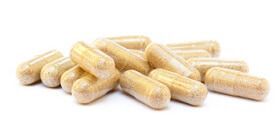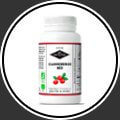Main properties and uses of brewer's yeast
Brewer's yeast is actually a colony of microscopic fungi (usually Saccharomyces cerevisiae or Candida utilis). Its composition, particularly rich in B vitamins (it is one of the most concentrated natural sources of B group vitamins) and minerals, make it the essential food supplement for the beauty of hair, skin and nails!!! It also offers a wide spectrum of both preventive and curative actions: fortifying, it would be ideal for participating in the treatment of deficiencies but also for effectively stimulating the immune system. It is also antimicrobial and would be effective against certain infections. What's more, its antioxidant activity plays a preventive role against many disorders.
Revivable brewer's yeast is particularly known for its probiotic activity, it acts on the digestive system and could have a positive effect on certain intestinal disorders.
Main uses of brewer's yeast:
- Physical fatigue:

- Strengthening the immune system:

- Beauty of skin, hair and nails:

- Digestive disorders (only for revivable brewer's yeast):

- Regeneration of intestinal flora (only for revivable brewer's yeast):

Secondary uses of brewer's yeast:
- Appetite problems:

- Excess cholesterol:

- Infections :

Different forms of use of brewer's yeast:
Brewer's yeast can be consumed in different forms:
- The brewer's yeast capsule is the only existing form along with the tablets.
- No known external use.

Brewer's yeast identity card
- Botanical name:
Saccharomyces cerevisiae - Synonyms:
inactive brewer's yeast
- Family :
microscopic fungus - Part used:
dried mushroom
- Cultivation period:
all year - Geographic origin :
Germany
+++ Inactive brewer's yeast is dried at high temperatures, which kills the living organisms that make it up. This brewer's yeast, however, retains its antioxidant, fortifying and nutritional properties. It is therefore ideal for skin, hair and nail problems and helps prevent unwanted effects from active yeast such as bloating.
+++ Revivable brewer's yeast, for its part, is dried at low temperature. The living organisms thus remain intact, making it a probiotic food. This type of yeast is recommended to regenerate the intestinal flora and participate in the elimination of toxins from the body. However, it can cause certain digestive side effects and, therefore, is not recommended when it comes to strengthening the body and treating skin or hair problems.
-
Brewer's yeast for the beauty of hair, skin and nails:
Dull, brittle, thin hair, soft or splitting nails, which break easily, skin lacking vitality, dull complexion, etc. A lack of B vitamins (B vitamins are, among other things, essential for the synthesis of keratin which we recall is the main constituent of nails and hair) is often the cause of these symptoms. The richness of brewer's yeast in B vitamins, potassium, calcium, magnesium and trace elements (selenium, zinc, copper, etc.) make it an essential food supplement for beauty (see its anti-acne actions , anti-irritation and anti-wrinkle in the following paragraph). -
Brewer's yeast as a fortifier:
Brewer's yeast contains a very large quantity of proteins and is rich in minerals including iron, magnesium, calcium, phosphorus and potassium. It also contains many vitamins, notably E and B. After spirulina, it is one of the natural sources with the highest protein content. Knowing that proteins are essential for muscle development, it can be very useful for athletes. It is also a great alternative for people following a vegetarian or vegan diet. Brewer's yeast is also known for its strengthening effect on hair, skin and nails. This effect is mainly due, as we have already mentioned, to its high concentration of B vitamins including biotin (vitamin B8 or otherwise called vitamin H). Dexpanthenol (or vitamin B5), for its part, would have an anti-acne action. Finally, nicotinamide (also called vitamin B3 or niacin) contained in brewer's yeast, would have a positive effect in the fight against acne but also in the face of skin irritation, fine lines and wrinkles, and pigmentary problems. Brewer's yeast not only acts on the health of the skin, hair and nails but represents a tonic for the entire body. Its concentration in iron would allow it to be a valuable ally in cases of iron deficiency anemia (anemia caused by iron deficiency). It is often used in cases of general fatigue or overwork. -
Brewer's yeast as an antimicrobial:
An antimicrobial is a substance that eliminates or slows the growth of microbes such as bacteria, viruses, parasites or fungi. Brewer's yeast has antimicrobial activity, particularly against Candida albicans. It is a species of yeast that is basically well tolerated by humans. However, it can become pathological and cause fungal infections (candidiasis), mainly in the gynecological and digestive mucosa, in the case of a weakened organism. What's more, brewer's yeast would be beneficial as an adjuvant treatment for typhoid fever (caused by Salmonella) but also against the swine flu virus. Finally, it would act on Trypanosoma brucei, a parasite responsible for sleeping sickness, and transmitted by the Tsetse fly, present in different regions of Africa.
-
Brewer's yeast as an antioxidant:
Brewer's yeast contains many antioxidants including glutathione, beta-1,3-glucan, trehalose and mannan. They have a positive effect on the immune system, while fighting against oxidative stress (a phenomenon caused by free radicals, a major cause of aging and various diseases). Brewer's yeast also contains zinc which is known for its strong antioxidant activity against free radicals. It thus plays a preventive role against premature aging. What's more, beta-1,3 glucan would be a good ally against excess cholesterol, just like selenium. -
Brewer's yeast as a probiotic (for revivable brewer's yeast):
Probiotics are live microorganisms that have a positive activity on the body. They are found in particular in the intestinal flora which is gradually formed in a living being after its birth, from populations of bacteria in the environment. When the intestinal flora is disrupted, the entire body suffers the consequences because it plays a major role in maintaining good health. It influences the immune system and can prevent different types of inflammation. It also has a regulatory activity on digestion and increases the absorption of nutrients. Its imbalance can cause annoying intestinal disorders such as diarrhea, bloating, irritation, gastroenteritis, etc. Regular consumption of probiotics can restore the balance of flora and help the body eliminate toxins. Brewer's yeast contains several strains of Saccharomyces cerevisiae, microorganisms (especially yeasts) which have a positive effect on the intestinal flora, participating in the proper functioning of the immune system. It could thus remedy various digestive disorders including diarrhea, particularly if this is caused by treatment with antibiotics. Probiotics are also known for their preventive and curative effects against certain intestinal diseases.

The most interesting synergies based on brewer's yeast
In order to optimize the effects of brewer's yeast, it is possible, or even recommended, to combine it with other plants, essential oils or natural active ingredients. Here you will find some advice depending on the problem concerned:-
Fatigue, immune strengthening:

Plants: maca, ginseng (against physical and intellectual fatigue), echinacea (strengthens the immune system)
Essential oils: Ravintsara (tonifying and immunostimulating), black spruce (against deep fatigue)
Other active ingredients: spirulina (against physical and intellectual fatigue), royal jelly (against fatigue, stimulates the immune system), propolis (strengthens the immune system) -
Beauty of skin, hair and nails:

Plants: nettle (acne, dry hair and brittle nails, eczema, psoriasis, itching)
Essential oils: carrot (skin fragility, dull skin), geranium (regenerating, healing, illuminating, stimulating), rosewood (regenerating, firming and balancing), fine lavender (balancing).
Other active ingredients: evening primrose oil (dry skin, eczema, psoriasis, itching), castor oil (plumping, softening), coconut oil (nourishes and smoothes the hair fiber), argan oil (softening, nourishing, anti- age). -
Digestive disorders (revivable brewer's yeast)

Plants: turmeric (symptoms of irritable bowel), black radish (against difficult digestion, bloating), ginger (digestive and anti-nausea)
Essential oils: peppermint (facilitates digestion), tarragon (against digestive disorders, antispasmodic)
Other active ingredients: vegetable charcoal (against bloating, diarrhea), inulin (prebiotic activity)
Precautions for use and contraindications of brewer's yeast:
This information is not exhaustive!! Always also consult the instructions on the product packaging as well as the manufacturer's recommendations. If in doubt, consult a health professional.
If you suffer from inflammatory bowel diseases (Crohn's disease, ulcerative colitis, etc.), it is recommended not to consume inactive brewer's yeast as it could aggravate these pathologies.
It is also not recommended for people allergic to biogenic amines. Reactions such as redness, itching and tissue swelling may occur.
Theoretically, individuals suffering from severe immunosuppression could be at risk (with revivable brewer's yeast) of sepsis due to the passage of the single-celled fungus Saccharomyces cerevisiae into the bloodstream, through the intestinal mucosa.
Consumed in high doses, brewer's yeast can cause some mild side effects such as stomach swelling or flatulence.
If you ever take revivable brewer's yeast to deal with certain symptoms such as diarrhea and they persist, do not hesitate to consult your doctor.
Such symptoms can hide a number of illnesses, which require medical consultation.
- Keep out of reach of young children.
- Use reserved for adults.
- Not recommended for children, pregnant or breastfeeding women.
- This product cannot replace a varied diet and a healthy lifestyle.
- Do not exceed the recommended daily dose
Interactions to consider with brewer's yeast:
Since brewer's yeast contains tyramine, it is not recommended for people taking antidepressant treatment such as MAOI (monoamine oxidase inhibitor). This could cause sudden high blood pressure, headache or severe nausea. Under normal conditions, the body naturally eliminates tyramine through its metabolism by the enzyme called monoamine oxidase (MAO). Certain antidepressants (MAOIs), by inhibiting this enzyme, cause a sudden accumulation of tyramine and the sometimes serious side effects that follow. Tyramine is also contained in many cheeses and patients taking this type of antidepressant should consume it with caution. This accumulation of tyramine following taking MAOIs is commonly called the “cheese effect”, and is well known to general practitioners, neurologists and psychiatrists.
Antifungal treatments could reduce the effectiveness of brewer's yeast.
If in doubt, seek the advice of your doctor or pharmacist.

Brewer's yeast and diabetes
Diabetes is a common disease whose prevalence (number of people affected) in France in 2009 reached 3.5 million. The current figures are similar. The complications associated with it are numerous and can be very serious (lower limb neuropathy, risk of stroke, kidney failure or myocardial infarction). We therefore decided to take stock of the effects that brewer's yeast could have against this disease.
WARNING: Brewer's yeast cannot in any way replace the advice of an endocrinologist.
Diabetes is a chronic condition for which there is no definitive cure but which can be controlled. However, it remains inconvenient and can have serious consequences. Some studies suggest that chromium could help people with diabetes by regulating blood sugar levels (blood glucose levels). Individuals suffering from diabetes do not produce enough insulin (a hormone whose role is, in particular, to convert glucose into energy), or their body does not use it correctly. Chromium is said to have the ability to lower blood sugar levels, reducing the level of insulin needed by the body. Since brewer's yeast is rich in chromium, scientists believe it could also help treat high blood sugar.
A study dating from 1997 evaluated the effects of high doses of chromium compared to those of placebo on people suffering from type 2 diabetes. The results obtained showed that chromium supplementation had a positive effect on the level of HbA1c (hemoglobin glycated), insulin, glucose and cholesterol. In 2006, other researchers studied the effects of chromium-enriched brewer's yeast on glucose, insulin, blood lipids and oxidative stress in people suffering from type 2 diabetes mellitus. suggested that this supplementation was safe and could have a beneficial effect on blood sugar levels and oxidative stress.
Another study was carried out in 2013 to discover the effects of brewer's yeast on serum lipoproteins and blood pressure, again in patients with type 2 diabetes mellitus. The clinical trial was carried out double-blind on 90 individuals, divided into two groups randomly: one receiving 1,800 mg of brewer's yeast per day and the other, the placebo. The trial lasted 12 weeks. The authors of the study concluded that brewer's yeast, in addition to usual antidiabetic treatment, can reduce systolic and diastolic blood pressure in diabetic patients.
The results of these studies are very encouraging. However, other clinical trials are necessary to better define the effects of brewer's yeast in diabetes as well as the dosage necessary to obtain beneficial effects.
Bibliography of this study: “Diabetes figures in France”. https://www.federationdesdiabetiques.org High intakes of supplemental chromium improve glucose and insulin variables in people with type 2 diabetes. Anderson RA, Cheng N et al. Diabetes. 1997 Influence of chromium-enriched yeast on glycemia and insulin variables, blood lipids and markers of oxidative stress in subjects with type 2 diabetes mellitus. Racek J, Trefil L et al. Biol Trace Elem Res. 2006 High intakes of supplemental chromium improve glucose and insulin variables in people with type 2 diabetes. Anderson RA, Cheng N et al. Diabetes. 1997 Brewer's yeast improves blood pressure in type 2 diabetes mellitus. Hosseinzadeh P, Djazayery A et al. 2013
Conclusion and professional opinion:
Brewer's yeast is a product very often used in herbal medicine. Its exceptional composition allows it to have numerous actions, both preventive and curative. General fortifier, it is useful in cases of temporary fatigue and helps improve sports performance. Its antioxidant properties make it an excellent ally in the fight against cellular aging. It is ideal for improving the beauty of skin, hair and nails. Its exceptional composition also allows it to fight against skin aging, acne, wrinkles and fine lines.
Revivable brewer's yeast, very effective in digestive disturbances due to an imbalance in the intestinal flora, has a regenerative effect and improves symptoms. However, it should be noted that when it comes to digestive problems, its effectiveness will depend on their origin. It may prove completely ineffective if these disorders are caused by an underlying pathology, in which case it is important to consult your doctor.
The data summarized here is given for information purposes and cannot engage our responsibility.
For further information on use, instructions for use, precautions to take and uses advised against, please refer to the commercial data sheet and label of your products. The food supplements described here are natural plant-based products. However, they are not without danger and without possible interactions with other medications or treatments. It is therefore very important to respect the recommended doses and to tell your doctor or pharmacist that you are taking these products: only he or she will be able to determine if any interactions exist between the food supplement and another treatment or medication that you may be taking.
The pathologies cited in this article are illnesses that can be serious or even life-threatening. A visit to a doctor remains essential. Only he will be able to make a precise diagnosis and, if necessary, provide you with the most appropriate treatment.
Bibliography
- Antimicrobial and probiotic properties of yeasts: from fundamental to new applications. Hatoum R, Labrie S, Fliss I. Front Microbiol. 2012
- Antigenotoxic effect of Saccharomyces cerevisiae on damage produced in mice fed with corn contaminated with aflatoxin B(1). Madrigal-Santillán E, Madrigal-Bujaidar E et al. Food Chemical Toxicol. 2006
- Comparison of Saccharomyces cerevisiae strains of clinical and nonclinical origin by molecular typing and determination of putative virulence traits. Klingberg TD, Lesnik U et al. FEMS Yeast Res. 2008
- Beneficial effects of probiotic and food-derived yeasts on human health. Moslehi-Jenabian S, Pedersen LL, Jespersen L. Nutrients. 2010
- Saccharomyces cerevisiae strain UFMG 905 protects against bacterial translocation, preserves intestinal barrier integrity, and stimulates the immune system in a mouse model of intestinal obstruction. Generoso SV, Viana M et al. Arch Microbiol. 2010
- Saccharomyces cerevisiae UFMG A-905 treatment reduces intestinal injury in a mouse model of irinotecan-induced mucositis. Bastos RW, Pedroso SH et al. Benefit of Microbes. 2016
- A randomized clinical trial of Saccharomyces cerevisiae versus placebo in irritable bowel syndrome. Pineton de Chambrun G, Neut C et al. Dig the Liver Dis. 2015
- Randomized, double-blind, placebo-controlled trial of Saccharomyces cerevisiae CNCM I-3856 in irritable bowel syndrome: improvement of abdominal pain and bloating in people with constipation-predominant. Spiller R, Pélerin F et al. Gastroenterol d'Europe unie J. 2016
- Effect of Saccharomyces cerevisiae strain UFMG A-905 in an experimental model of inflammatory bowel disease. Tiago FC, Porto BA et al. Benefit of Microbes. 2015
- Saccharomyces cerevisiae CNCM I-3856 prevents colitis induced by AIEC bacteria in the transgenic murine model mimicking Crohn’s disease. Sivignon A, de Vallée A et al. Inflammation of the bowel. 2015
- Nicotinic acid/niacinamide and skin. Gehring WJ Cosmet Dermatol. 2004
- Therapeutic activity of a probiotic based on Saccharomyces cerevisiae and an inactivated whole yeast on vaginal candidiasis. Pericolini E, Gabrielli E et al. Virulence. 2017
- Oral treatment with Saccharomyces cerevisiae strain UFMG 905 modulates immune responses and interferes with signal pathways involved in the activation of inflammation in a mouse model of typhoid fever. Martins FS, Elian SD et al. Int J Med Microbiol. 2011
- Antiviral effect of Saccharomyces cerevisiae beta-glucan against swine influenza virus by increased production of interferon gamma and nitric oxide. Jung K, Ha Y, Ha SK et al. J Vet Med B Infect Dis Vet Public Health. 2004
- Acid tolerance and fecal recovery after oral administration of Saccharomyces cerevisiae. Scevola D, Perversi L et al. J Chemother. 2003
- “Nutritional yeast”. https://draxe.com
- “Guide to plants in phytotherapy classified by needs”. http://mycosmetik.fr
- "Brewer's yeast". http://www.webmd.com
- "Diabetes figures in France". https://www.federationdesdiabetiques.org High intakes of supplemental chromium improve glucose and insulin variables in people with type 2 diabetes. Anderson RA, Cheng N et al. Diabetes. 1997
- Influence of chromium-enriched yeast on glycemia and insulin variables, blood lipids and oxidative stress markers in subjects with type 2 diabetes mellitus. Racek J, Trefil L et al. Biol Trace Elem Res. 2006
- High intakes of supplemental chromium improve glucose and insulin variables in people with type 2 diabetes. Anderson RA, Cheng N et al. Diabetes. 1997
- Brewer's yeast improves blood pressure in type 2 diabetes mellitus. Hosseinzadeh P, Djazayery A et al. 2013
- “OPINION of the French Food Safety Agency relating to the evaluation of nutritional claims concerning the bifidogenic effect of inulin on human intestinal flora”. ANSES. 2005
- Clinical indications for the use of antineutrophil cytoplasmic antibodies and anti-Saccharomyces cerevisiae antibodies in the evaluation of inflammatory bowel disease in an academic medical center. Gupta A, Derbes C, Sellin J. Inflamm Bowel Dis. 2005
NOTE: This article was written by a pharmacist. The data summarized there come from the scientific literature and the references cited above. For medical advice, in the event of specific or prolonged symptoms, please consult your doctor. Only he will be able to make a precise diagnosis and, if necessary, provide you with the most appropriate treatment.
 OUR
OUR